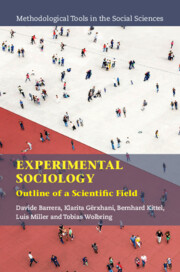Book contents
- Experimental Sociology
- Methodological Tools in the Social Sciences
- Experimental Sociology
- Copyright page
- Contents
- Figures, Tables, and Boxes
- Preface
- 1 Introduction
- Part I The Philosophy and Methodology of Experimentation in Sociology
- 2 The Development of Experimental Sociology
- 3 What Makes Sociological Experiments Different from Other Experiments?
- 4 Experiments and Causality
- 5 Experimental Designs and Typologies
- Part II The Practice of Experimentation in Sociology
- Part III Methodological Challenges of Experimentation in Sociology
- References
- Index
5 - Experimental Designs and Typologies
from Part I - The Philosophy and Methodology of Experimentation in Sociology
Published online by Cambridge University Press: 23 November 2024
- Experimental Sociology
- Methodological Tools in the Social Sciences
- Experimental Sociology
- Copyright page
- Contents
- Figures, Tables, and Boxes
- Preface
- 1 Introduction
- Part I The Philosophy and Methodology of Experimentation in Sociology
- 2 The Development of Experimental Sociology
- 3 What Makes Sociological Experiments Different from Other Experiments?
- 4 Experiments and Causality
- 5 Experimental Designs and Typologies
- Part II The Practice of Experimentation in Sociology
- Part III Methodological Challenges of Experimentation in Sociology
- References
- Index
Summary
This chapter focuses on different research designs in experimental sociology. Most definitions of what constitutes an experiment converge on the idea that the experimenter "control" the phenomenon under investigation, thereby setting the conditions under which the phenomenon is observed and analyzed. Typically, the researcher exerts experimental control by creating two situations that are virtually identical, except for one element that the researcher introduces or manipulates in only one of the situations. The purpose of this exercise is to observe the effects of such manipulation by comparing it with the outcomes of the situation in which the manipulation is absent. One way to look at how the implementation of this rather straightforward exercise produces a variety of designs is by focusing on the relationship that experimental design bears with the theory that inspires it. Therefore, we begin this chapter with a discussion of the relationship between theory and experimental design before turning to a description of the most important features of various types of designs. The chapter closes with a short overview of experiments in different settings such as laboratory, field, and multifactorial survey experiments.
Keywords
- Type
- Chapter
- Information
- Experimental SociologyOutline of a Scientific Field, pp. 52 - 66Publisher: Cambridge University PressPrint publication year: 2024

